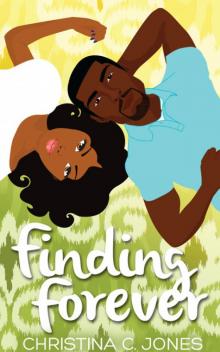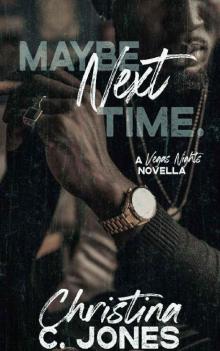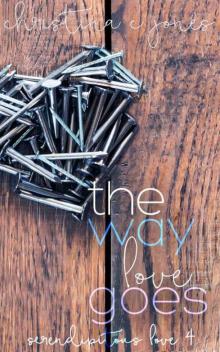- Home
- Christina C Jones
Wonder Page 2
Wonder Read online
Page 2
The world had ended, rebooted itself, and this was what we got.
It was ungrateful of me to view the palm trees and balmy weather with such disdain, but I chalked it up to cabin fever. Anybody would be sick of the same thing every day, would want something more than what they’ve always known, right? Division Two got lots of rain and ice, sometimes snow – a phenomenon I’d only ever seen in pictures.
Here?
Sometimes it rained.
Often, that rain smelled like death, and the Apex would all but shut down, because their delicate noses couldn’t handle the stench. I loved those days. I got to sip my coffee ration slower, watching the toxic rain streak down the windows. Other times though, the rain came with storms.
I didn’t love those.
Those were terrifying messes of destructive lightning and sonorous thunder and sheets of rain that made you wonder if yet another reckoning was coming. Before she passed, I remembered my father’s mother fussing that back when she was my age, they didn’t have to worry about being wiped out by a thunderstorm, that they were common occurrences that rarely had the potential to remap the earth.
I always bit my tongue instead of reminding her they should have worried.
They should have worried a lot.
But now, here we were.
Unpredictably destructive weather, drastically different climates, all packed onto what was left after the world decided to try to take us out, just trying to live.
I moved, before one of the guards noticed I’d been standing there too long and decided I was suspicious. I had errands before I got home, and dinner to make once I arrived, and had already spent too much time daydreaming.
My first stop was the specialty dry cleaner I couldn’t afford to not be able to afford. The salon’s strict dress code even included the shade – no faded, off-black. Inky pure black, always, or you’d be sent home without your wages, which wasn’t an option for most of us. So I paid what I had to for another week of work clothes, to keep the job that kept me alive.
With that bundle draped over my arm, I headed for the market. My heart clenched at the sight of the armed guards that flanked the doors, demanding ID from anyone who wanted to enter. I pulled my same address-hiding trick here, and they waved me inside with barely a glance. I dumped my clothes over the side of a cart and started down the aisles, grabbing only the absolute necessities. It hurt every day to wheel my meager collection past the coffee display, the aroma goading me, wrapping around me to remind me that nice things would never be a part of my life. Not as long as—
“Keep it moving!” an armed guard barked in my ear, shoving me forward in the line. I used my grip on the basket to steady myself, knowing better than to say anything back or look his way.
I kept it moving, like I’d been told.
Weighed down with bags, I moved much slower leaving the market than I did on the way there. I glanced up at the sky, willing the sun to relax a little, not to run so fast to get behind the horizon, to turn everything dangerous and dark. I was ready to drop everything and run if necessary.
It wasn’t today.
This time when I sighed, it was out of relief to be on the right side of my locked front door, in the relative safety of home. Maybe I was being paranoid, but so far, that paranoia had kept me alive, and I saw no reason to change it.
I stopped by the kitchen first, allowing the low, familiar hum of the old, beat-up refrigerator to soothe me. I remembered the whole family eating light to afford the extra cost the week my father brought it home, but I’d never seen my mother smile so much. Now that they were gone, it had a dual utility – cold storage, and a warm memory.
Once I’d put away the groceries, I moved to my room – the main bedroom, which had been my parents’. I hung my work clothes in the closet, then went to check the panel that monitored our electricity usage – yet another thing that was rationed. A rare smile lit my face when I saw that my house was well under-budget for the month, which meant I could indulge myself with a hot shower that lasted longer than three minutes.
“Maybe a whole ten…” I mused to myself as I sat down on the end of the bed to take off my shoes and give my aching feet some relief. “Or I should wait until the end of the week…”
It wasn’t until I was putting my shoes in the closet that I realized something was off. I’d been so absorbed in my own thoughts that the overwhelming emptiness of the house hadn’t struck me.
It did now.
Barefoot, I padded across the worn carpet and flung my door open, heading down the hall. I didn’t stop moving until I reached another door, where I listened first. When I heard nothing, I knocked. When the knock went unanswered, my heart dropped.
Where the hell is Nadiah?
I opened the door just to check, but I already knew she wasn’t there. Panic gripped my chest as I looked around for a note, a clue, anything, but found nothing. I swallowed hard, choking down the disappointment of what I knew I had to do next.
There goes that long shower.
In fact, there went a lot of day-to-day comforts our meager ration of electricity afforded. I went back to the panel in my room, dreading the necessary but not putting it off.
I had to make a call.
When the new government took over, they’d confiscated any electronic that had a memory or storage. They called it anti-terrorism, and had torn up homes and ended lives, over cell phones and laptops. Eventually, citizens were given access again, but at a cost. Only the hyper-rich could afford the devices sold at Apex stores, and anyone caught making, selling, or owning a counterfeit was subject to prosecution.
Persecution.
And they made sure we knew.
Instead of subjecting myself to those possibilities, I was content with the call function on the panel – monitored and recorded, and they ate up electricity like a vacuum. I rarely used the ability, largely because I didn’t know many people to call. But now, with the sun long-gone from the sky, and Nadiah nowhere to be found, it was necessary.
So I made the call.
It took Gran a bit to answer because of the time. I knew I’d woken her up, and felt bad about it, but I’d feel worse if I didn’t do everything I could to figure out where the hell my sister was.
“What happened?” she asked, as soon as her face appeared on the screen. Momentarily, Nadiah left my mind as I processed Gran’s gaunt likeness. Before the illness, she’d been vibrant – full cheeks and full of life. Her face was hollow now, and her floral robe hung loose over bony shoulders. Just two days ago I’d made the trek to see her in person, and had fought to stay upbeat, to not let her see the impending doom I felt. Even more of the light was gone from her eyes now.
“Are they giving you your treatments?” I asked, ignoring her question. Most of my peers at the salon lived somewhat worry-free lives, in the Upper Mids, the neighborhoods nearest the Apex. They didn’t worry about electricity, or food, or much crime. Unfortunately, that wasn’t my life.
My grandmother had already needed round-the-clock care, when my parents were still alive. Between their two incomes, they could afford it, even though it was tight.
They weren’t here anymore.
It was just me now, taking care of two other women – one elderly and sick, the other a near-genius who needed to be in school. Just yesterday, she’d gotten a letter about a potential scholarship to finish her post-secondary schooling up in the Apex, which was huge. We couldn’t ignore that.
So Gran went to the “retirement” community, which I hated, but was cheaper than the private care she’d had before. It wasn’t ideal, but we managed, and I could afford a luxury here and there for her – nice bed linens, tea in the mornings.
But then she got sicker.
Which meant no luxuries for any of us.
“They’re giving me the treatments,” Gran coughed. “I’m just an old woman. Saving the mascara for special occasions,” she rasped, trying to make me smile.
I didn’t.
I couldn’t.
“If they’re not, I need you to tell me. I’m paying for—”
“I keep telling you, you should stop,” Gran interrupted, shaking her head. “Let me die with some dignity before I lose anybody else.”
Swallowing hard, I averted my gaze from the screen. This wasn’t her first time making this request – one I was too selfish to honor.
I didn’t want to lose anyone else either.
“You’re talking crazy,” I told her, in a soothing tone. “You’re not dying. Don’t talk like that.”
“I’ll talk how I want to,” was her brittle response. “Now what do you want? You didn’t interrupt my sleep with an expensive call for nothing. What happened?”
I scoffed over her changing the subject, but she was right. “Did Nadiah make it to see you today, after school?”
Gran’s half-empty smile gaped across the screen. “Yes, I saw my pretty grandbaby today. She was excited. Had found something in a book about some ruins.”
I frowned. “Ruins?”
“Yeah, the destroyed city, the bridge, all that. She was going to go poke around.”
“Today? She said she was going today?”
“She didn’t say. Just that she was excited about it.”
“Okay,” I sighed. “When did she leave?”
Gran thought about it for a moment, then answered, “Must’ve been about four o'clock. Why? Did something happen?”
I contemplated not telling her, but knew she’d just chew me out about it when she found out. “She’s not here. She’s not home. And there’s no note or anything. I’m worried.”
“She’s not home at this time of night, and you called me instead of the police?” Incredulity laced her tone, but my tone was the same when I replied.
“What exactly were the police going to do?”
Maybe in the Apex or Upper Mids, the APF would mount up to find a missing young woman, in hopes of returning her to her family. Everywhere else, reporting something like this to the police could be just as easily putting a target on her back – a blaring beacon that there was an attractive young woman out somewhere in this city, alone.
I had no intention of doing such a thing.
A tiny chime sounded, letting me know the call had surpassed five minutes – I could only afford seven before I started digging into credit, and debt was absolutely non-negotiable for me. I rushed my grandmother off the phone, urging her to get some sleep, and promising that I would keep her updated on Nadiah.
I couldn’t bring myself to look at how much the call had cost once it was over.
Instead, I went to my closet, digging out the heavy boots I wore when it rained. They’d belonged to my mother, and didn’t look nice by any stretch of the imagination. But they were sturdy and reliable, and the protection I needed if I was going into ruins to find my sister.
I put them on, along with a jacket I stashed full of granola bars and two canteens of filtered water. I thought for a moment, then stuffed an inside pocket with alcohol pads and gauze, just in case. And then I stood in the living room, lost.
I had no idea where my sister had gone.
No idea where to even start.
That realization made me sink to the floor as emotion bubbled up from somewhere deep. Nadiah had always been curious, always digging into facts and possibilities, always so intrigued by how we’d gotten here. About our history.
Whenever she could, she went as far as she was allowed, exploring vacant houses and bringing back little treasures for whoever wanted them – me, Gran, her friends. But that was the key – she always came back. When I got home from work, from running my errands, Nadiah would be in her room, poring over some magazine or book she’d found.
I tried my best to choke back impending sobs over the possibility of not seeing Nadiah’s face again – of her not walking through the door with a big smile and a handful of ink pens she’d scavenged for my collection.
I didn’t know what to do next, and that was a very specific sort of horror.
Before I could give in to it, someone knocked at the back door.
A frantic, desperate knocking that pulled me to my feet and into a full sprint to get there, flinging the door open without checking through the window first, hoping that it would be my sister on the other side of the threshold.
It was not.
Three
“Bunny?” I said, then pulled Nadiah’s friend into the house, glancing around the yard before I locked the door again. “What are you doing here? It’s late!”
“I know,” she said, looking at me with glassy eyes. The sweet, almost cartoonish face that had earned her nickname was pulled into a frown, her voice anxious as she tugged at the hem of her white sweater. “But Nadiah, she’s—”
“You know where she is?!”
Her front teeth – just slightly too large for her face, another contributing factor to the nickname she’d embraced – came down over her bottom lip, digging in. “Uh, yes and no.”
“What the hell does that mean?!” I hissed, grabbing her by the shoulders. “Where is my sister?!”
“Oakland, I think. At least that’s where I last saw her.”
I frowned. “Oakland? It doesn’t even exist anymore. And what do you mean that’s where you last saw her?”
“Well, it was the area that was Oakland. Before the earthquake smashed everything in.”
I shook my head, still confused. “You’re not making any sense girl. Make it make sense, now.”
“Out in the ruins.”
“The ruins that are all covered in poisonous plants and teeming with dangerous wildlife? Those ruins?” I asked, eyes wide.
Bunny grinned. “That’s what they tell us, but that’s not it. There’s nothing out there. It’s quiet, and you can see the stars. It’s beautiful.”
“And that’s where Nadiah is? Why didn’t she come back with you?”
That grin melted off her face. “Well, we kinda went too far. The ruins connect to the Burrows without having to go through the gate. And neither of us had ever seen them before, so we…”
My heart rocketed past my stomach, landing somewhere near my feet. “You went to the Burrows? Are you… you’ve gotta be kidding me!” I gritted those last words through my teeth, trying my best to temper my anger. Nadiah and Bunny were both young, nineteen. They were kids, and kids did stupid things, but this was…
“I’m so sorry, Aly,” Bunny whimpered, fidgeting now with the hot pink watch on her wrist – a gift that had undoubtedly come from my sister. Now though, I wondered if her explorations had been as safe as she’d always assured me. “We wanted to see for ourselves, but then some guy started yelling at us, and we ran, to hide. But then Nadiah fell, and—”
“She fell?! Is she okay?!” I asked, though I could already guess the answer. If she was okay, she’d be here.
With her head hung low, Bunny admitted, “There’s something wrong with her ankle. There was no way she could make it back on it. I got back here as soon as I could, and that’s it. That’s the whole story.”
I cupped a hand over my mouth, clamping it tight to keep myself from screaming. After a deep breath, I asked, “So where is she? Is she somewhere out in the open, is she safe?”
“She’s in a house. An abandoned house out there that we got into. She’s hidden. No one knows she’s there, no one saw us go in or out.”
My eyes narrowed. “You sure?”
“I’m sure,” she insisted. “And I can lead you there. With two of us, we can get her back.”
“If we don’t get arrested, for being in a restricted area,” I countered, shaking my head. It was a risk I was willing to take to get my sister back, but I had to be realistic. This was dangerous.
“If you follow me, we’ll be there in no time. Nobody will see us.”
I scoffed. “With you in that bright white sweater? Shouldn’t you change into something dark, so you don’t get caught?”
“I always wear white,” she said. “An
d I’ve never gotten caught.”
“Except today,” I wanted to counter, before I caught the implication of her words.
She wasn’t the reason they’d gotten caught.
“We have to go,” Bunny spoke up, already moving toward the door. “Nadiah was in a lot of pain, and I’ve already been gone almost two hours.”
My eyes bugged wide. “She’s two hours away?!”
“Just about. I stopped by my house, to get her something for the pain before I came to you.” She looked at her watch again, then back up at me, bouncing anxiously on the balls of her feet. “We gotta go.”
Knowing she was right, I glanced around the house one last time, trying to decide if there was anything I’d forgotten. And then, I followed Bunny out my back door.
The earthquake got one paragraph in our history book.
Our teachers didn’t want to get in trouble for going outside the text, so they didn’t, but our parents and grandparents, and so on, filled the gaps where they could. Once upon a time, the San Francisco Bay had been the largest estuary on the coast, but after a 9.2 magnitude earthquake that spread hundreds of miles had remixed that area, all traces of it were gone. Whatever the earthquake didn’t destroy was taken by fire, which the subsequent tsunami quelled.
The paragraph was in a chapter full of short descriptions of how all the former major cities got destroyed. There was too much horror to give any of it the full color it deserved, at least in a basic classroom textbook. They wouldn’t have had space for all the government indoctrination then.
Those pages contained few pictures, and the Bay Area Disaster wasn’t one. After sneaking through the Mids with Bunny as my guide, I thought my mind had already been blown. But once she’d led me through a partially destroyed underground tunnel that let out in what she and Nadiah referred to as the Ruins, I understood that no, I hadn’t seen anything yet.
I’d heard from my grandfather that “That big ass bridge just folded up like a pocket knife and fell over”. Maybe the “pocket knife” thing was why I’d underestimated the size of the San Francisco Bay Bridge, likening it to the simple bridges that dotted the Apex, connecting one part of the city to the other.

 Controlled Chaos
Controlled Chaos Deuces Wild
Deuces Wild In Tandem
In Tandem Christmas With the Wrights: A Wright Family Holiday Short (Wright Brothers Book 4)
Christmas With the Wrights: A Wright Family Holiday Short (Wright Brothers Book 4) Me + Somebody's Son: A Heights Story
Me + Somebody's Son: A Heights Story Love Notes (Equilibrium Book 1)
Love Notes (Equilibrium Book 1) Wonder
Wonder Bittersweet: An Equilibrium Novella
Bittersweet: An Equilibrium Novella Behind the Scenes
Behind the Scenes Didn't Mean To Love You (Serendipitous Love Book 2)
Didn't Mean To Love You (Serendipitous Love Book 2) Close Contact (Clarke Brothers Book 3)
Close Contact (Clarke Brothers Book 3) A Crazy Little Thing Called Love (Serendipitous Love Book 1)
A Crazy Little Thing Called Love (Serendipitous Love Book 1) Finding Forever
Finding Forever Pass Interference (Connecticut Kings Book 6)
Pass Interference (Connecticut Kings Book 6) Maybe Next Time
Maybe Next Time Fall In Love Again (Serendipitous Love Book 3)
Fall In Love Again (Serendipitous Love Book 3) The Way Love Goes (Serendipitous Love Book 4)
The Way Love Goes (Serendipitous Love Book 4) The Lies: The Lies We Tell About Love, Life, and Everything in Between
The Lies: The Lies We Tell About Love, Life, and Everything in Between Something Like Love (Serendipitous Love Book 6)
Something Like Love (Serendipitous Love Book 6) Love You Forever (Serendipitous Love Book 5)
Love You Forever (Serendipitous Love Book 5) Relationship Goals
Relationship Goals Determining Possession (Connecticut Kings Book 3)
Determining Possession (Connecticut Kings Book 3) Release Me If You Can
Release Me If You Can Love on the Highlight Reel (Connecticut Kings Book 2)
Love on the Highlight Reel (Connecticut Kings Book 2)